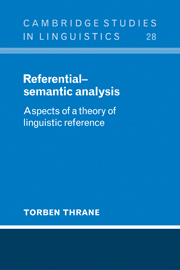8 - INDEFINITE EXPRESSIONS
Published online by Cambridge University Press: 06 August 2010
Summary
Indefiniteness: sortal and selective expressions
In chapter 4 we established a distinction between three referential functions, sortal, selective, and identitive, and in chapter 7 we found that four classes of referential functives can be identified on distributional grounds. In this and the following two chapters I shall attempt to synchronize the notions of referential function and referential functive. This endeavour, which might be described as an attempt to synchronize functional and formal phenomena, constitutes the synthesis of the present work.
Let me begin by reminding the reader of my use of the term ‘referential expression’ (§4.1). A referential expression is a NP considered as a distributionally defined syntagm, the meaning of which equips it as a potential linguistic correlate of non-linguistic entities. According to which kind of referential function a given NP is held to perform, we may speak of sortal, selective, or identitive expressions, and according to which type of referential functive forms (part of) a given NP, we may likewise speak of quantified, E-classified, determiner, or pronominal expressions. Instead of the latter designation we shall usually speak simply of pronouns, however.
It is clear already, for numerical reasons, that there is no one-to-one correlation between, on the one hand, sortal, selective, and identitive expressions, on the other quantified, E-classified, determiner and pronominal expressions. It is therefore not the case that, e.g. a determiner expression always performs one and only one type of referential function.
- Type
- Chapter
- Information
- Referential-Semantic AnalysisAspects of a Theory of Linguistic Reference, pp. 157 - 177Publisher: Cambridge University PressPrint publication year: 1980



